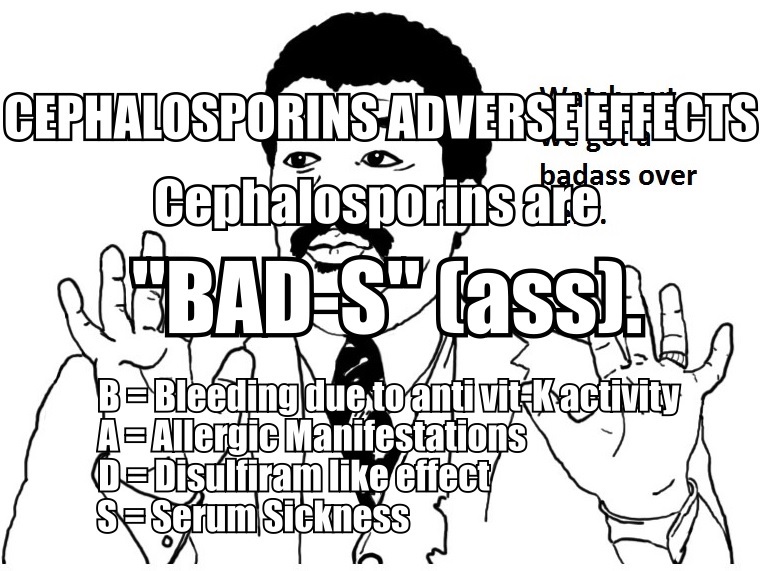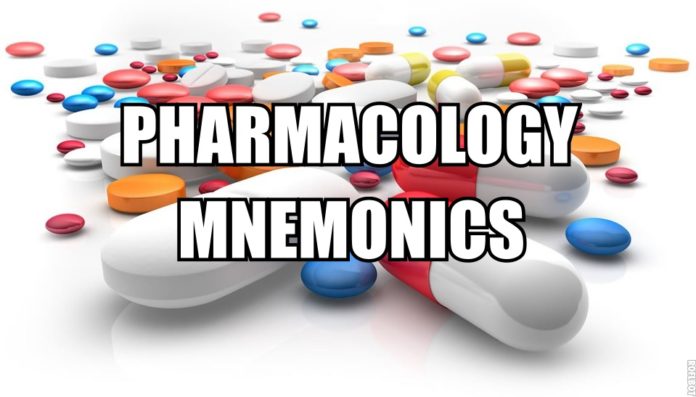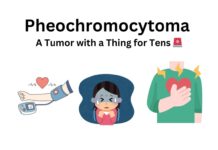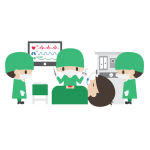Cephalosporins are a class of β-lactam antibiotics indicated for the prophylaxis and treatment of bacterial infections. They are bactericidal and cause the death of the bacteria by disrupting the synthesis of “peptidoglycan” thus interrupting the formation of the bacterial cell wall. In this article, we’ll share with you Cephalosporins Adverse Effects Mnemonics. But before that, let’s look at a few important things. 🙂
Cephalosporins Spectrum
The first generation of cephalosporins is active against gram-positive bacteria while rest of the generations show greater activity against gram-negative bacteria.
READ ALSO: Easy To Remember Pharmacology Mnemonics (With Pictures)
Cephalosporin Generations
| 1st Generation | 2nd Generation | 3rd Generation | 4th Generation |
| Cephalexin Cephalothin Cephradine Cefazolin Cefadroxil |
Cefotetan Cefoxitin Cefuroxime Cefaclor Cefprozil |
Cefixime Cefotaxime Ceftazidime Ceftriaxone Cefoperazone Ceftibuten |
Cefepime |
Cephalosporins Adverse Effects
Below are the adverse effects of Cephalosporins:
- Nephrotoxicity
- Hypersensitivity
- Aplastic Anemia
- Necrolysis
- Toxic Epidermal Necrolysis
- Disulfiram like reaction
- Thrombophlebitis
- Allergic Manifestations
- Super Infections
Cephalosporins Adverse Effects Mnemonics
Here are the Cephalosporins adverse effects mnemonics. We hope these mnemonics for cephalosporins adverse effects will make it easy for you to recall them during the exam:

Cephalosporins are “BAD-S” (ass)
B= Bleeding due to anti vitamin-K activity
A= Allergic Manifestations
D= Disulfiram-like effect
S= Serum Sickness
We hope that this mnemonic will make it easy for you to remember the important adverse effects of the cephalosporins. 🙂
GOOD LUCK! 🙂
Do you have a better mnemonic? Please use the comment box below and share with us. Thanks! 🙂





![Carcinoid Syndrome Mnemonic [Easy-to-memorize] Carcinoid Syndrome Mnemonic](https://www.medicosrepublic.com/wp-content/uploads/2024/08/Carcinoid-Syndrome-Mnemonic-Easy-to-memorize-218x150.jpg)

![Stages of Neurocysticercosis Mnemonic [Vegans Can’t Get Neurocysticercosis] Stages of Neurocysticercosis Mnemonic](https://www.medicosrepublic.com/wp-content/uploads/2023/08/Stages-of-Neurocysticercosis-Mnemonic-Vegans-Cant-Get-Neurocysticercosis-1-218x150.jpg)
![Image-guided spine interventions PDF Free Download [Direct Link] Image-Guided Spine Interventions PDF](https://www.medicosrepublic.com/wp-content/uploads/2023/06/Image-Guided-Spine-Interventions-PDF-150x150.jpg)
![All In The Mind PDF Free Download [Direct Link] All In The Mind PDF](https://www.medicosrepublic.com/wp-content/uploads/2023/04/All-In-The-Mind-PDF-150x150.jpg)
![Winning Personal Injury Cases: A Personal Injury Lawyer’s Guide to Compensation in Personal Injury Litigation PDF Free Download [Direct Link] Winning Personal Injury Cases: A Personal Injury Lawyer’s Guide to Compensation in Personal Injury Litigation PDF](https://www.medicosrepublic.com/wp-content/uploads/2023/02/Winning-Personal-Injury-Cases-A-Personal-Injury-Lawyers-Guide-to-Compensation-in-Personal-Injury-Litigation-PDF-Free-Download-e1676039612209-150x150.jpg)
![Gray’s Anatomy for Students 3rd Edition PDF Free Download [Direct Link] Gray's Anatomy for Students 3rd Edition PDF](https://www.medicosrepublic.com/wp-content/uploads/2017/11/Grays-Anatomy-for-Students-Third-Edition-PDF-Free-Download-150x150.jpg)
![Medical Billing 101 PDF Free Download [Direct Link]](https://www.medicosrepublic.com/wp-content/uploads/2023/03/Medical-Billing-101-PDF-150x150.jpg)
![Picmonic 4 Weeks to NCLEX Workbook & Study Planner PDF Free Download [Direct Link] 4 Weeks to NCLEX® Workbook & Study Planner Nursing Mnemonic Visual Learning Resource by Picmonic PDF](https://www.medicosrepublic.com/wp-content/uploads/2022/12/4-Weeks-to-NCLEX®-Workbook-Study-Planner-Nursing-Mnemonic-Visual-Learning-Resource-by-Picmonic-PDF-Free-Downloa-150x150.jpg)
![Emergency Management and Tactical Response Operations PDF Free Download [Direct Link] Emergency Management and Tactical Response Operations PDF](https://www.medicosrepublic.com/wp-content/uploads/2023/07/Emergency-Management-and-Tactical-Response-Operations-PDF-150x150.jpg)
![Maternal-Child Nursing 5th Edition PDF Free Download [Direct Link] Maternal-Child Nursing 5th Edition PDF](https://www.medicosrepublic.com/wp-content/uploads/2023/02/Maternal-Child-Nursing-5th-Edition-PDF-150x150.jpg)
![Inside the Human Body 1st Edition PDF Free Download [Direct Link] Inside the Human Body 1st Edition](https://www.medicosrepublic.com/wp-content/uploads/2023/06/Inside-the-Human-Body-1st-Edition-PDF-1-150x150.jpg)
![Diagnostic Atlas of Renal Pathology 2nd Edition PDF Free Download [Direct Link] Diagnostic Atlas of Renal Pathology 2nd Edition PDF](https://www.medicosrepublic.com/wp-content/uploads/2018/09/Diagnostic-Atlas-of-Renal-Pathology-2nd-Edition-PDF-Free-Download-150x150.jpg)




